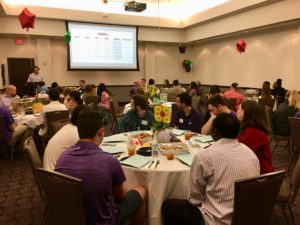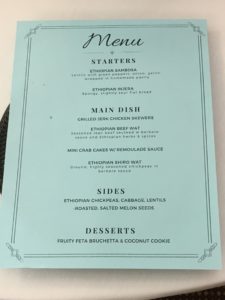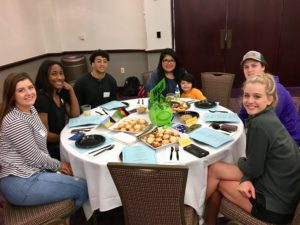
By Christina Ligi, News and Media Studies major, Class of 2019
This semester, students in the Intercultural Communication class hosted Food and Culture Conversations Day focused on diasporic communities in Africa and how people communicate and reveal identities through food.
The “What’s Next?” grant, awarded by Schieffer College Dean Bunton, encouraged Dr. Debi Iba, Communication Studies instructor, and Dr. Melissa Schroeder, chair of the Communications Studies department and associate professor, to create an intercultural food talk event.
The grant’s initial purpose was set to highlight a Rwanda woman’s lifestyle, including food and market shopping. Year after year, this grant has evolved into a much larger reaching audience, which has allowed a more expansive discovery.
Dr. Iba found this particular emphasis would serve best located in the Intercultural Communication course she co-teaches with Communication Studies Instructor Carrie Moore.
The class uncovered what moves a population out of their current homeland and what it means when these communities try to develop a new home and recapture that comforting feeling after they move away.
Through their coursework, the students prepared, researched and executed this event.
Throughout the research process, Sydney Pickral, Political Science and Communication Studies student, was most surprised by the different role food and meals play in different cultures. She said, “Some cultures really value long sit down meals, some consider it rude if you don’t finish, some don’t eat dinner until 9 or 10 p.m. It was just interesting to see how it shapes the everyday life of every member of a culture.”
They developed key “guiding questions” that allowed the students to think about their own personal food talk and how they were to use that in meeting others. Next, the students were tasked with generating an invitation list and sending out emails. They reached out to John Singleton in the Office of International Studies, connected with the African Student Association (ASA) and then it became a “snowball invite list,” said Dr. Iba.
The most surprising challenge was the search for a catering company who could provide African culture foods. After going back and forth with two potential caterers, they both found this job to be too overwhelming and deferred their offer.
After the class sampled the menu at Samson’s Market and Bistro, an Ethiopian restaurant in Fort Worth, their search ended and the restaurant agreed to cater the event. In addition, Sodexo, TCU’s catering partner, prepared some meals from African origin like chicken skewers and crab cakes. Dr. Iba also brought in a few market staples from a West African market.

Moore said this event truly stimulated the feelings and mood of diasporic communities. African food culture is regionally based, meaning each region, North, South, East and West, is specific to certain meals and preparations. Every seven minutes, guests would rotate to a different table, which represented a different region and a different food. This showed the chaos of moving, but also the excitement of change andbeginning fresh conversations.
Dr. Schroeder said, “the essence of the event was bittersweet.” The attendees evoked similar emotions of those from diasporic communities.
Overall, Iba said the event was a huge success and the guests left full of great conversations and great food.

